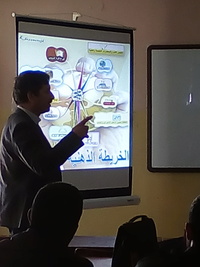freeman
المـديـر العـــام


عدد المساهمات : 19334
تاريخ التسجيل : 05/01/2011
العمر : 64
الموقع : http://sixhats.jimdo.com/
 |  موضوع: Music and the Brain موضوع: Music and the Brain  الأربعاء يونيو 08, 2011 10:29 am الأربعاء يونيو 08, 2011 10:29 am | |
| Although interest in music and the mind dates at least as far back as Plato, the neuroscientific study of music is a young discipline. Our approach reflects the belief that research on music has the potential to illuminate fundamental aspects of human brain function, including language, the active nature of perception, and the processing of complex sequences that unfold in time. Research on music at The Neurosciences Institute falls into three broad areas:
The relationship of Music and Language
Both music and spoken language feature rich rhythmic and melodic structure. Furthermore, both employ a finite set of basic elements (such as tones or words), which are combined in principled ways to create novel, hierarchically organized sequences. That is, music and language share the crucial feature of being syntactic systems.
Given these similarities, are music and language largely independent brain functions, or do they have an important degree of overlap? We have addressed this question in three different areas: the relationship of syntactic processing in music and language, the relationship of music to the melody and rhythm of speech, and the relationship between musical tone deafness and speech intonation perception. Our research has reveled a significant degree of overlap between music and language processing. Using methods that span neuroimaging, neuropsychology (e.g., the study of music processing in aphasia), and behavioral studies, we are exploring this overlap as a novel way to illuminate the cognitive and neural foundations of both domains.
Musical Rhythm and the Construction of Perception
Perception is not just a passive registering of what is “out there” in the world, but a constructive process involving active interpretation, as well as integration across brain systems. The phenomenon of a musical beat nicely illustrates this fact. Every human culture has some form of music in which listeners perceive a regular beat, and in every culture, people move in synchrony with the beat of music. Musical beat perception and synchronization may seem like simple abilities since they are so widespread, but appearances can be deceptive. Humans are the only species to spontaneously move in synchrony with a musical beat, and can extract a beat from complex rhythmic patterns. This raises the question of what aspects of our brain support this remarkable ability. We have studied musical rhythm perception to examine the coupling between the auditory and motor system, and how this coupling differs from the coupling of visual and motor systems. In addition, we have studied brain mechanisms of beat perception, suggesting a possible role for the motor system in how we hear a beat. Understanding how the auditory and motor systems are coupled in beat perception and synchronization could help in the development of treatments for certain motor disorders, such as Parkinson’s disease, in which rhythmic music is known to help people initiate and coordinate movement.
Temporal Dynamics of Brain Activity During Auditory Perception
We believe that understanding the fine temporal details of brain responses to sound is important for understanding brain mechanisms of auditory processing. We have developed novel methods for tracking stimulus-related brain activity from the auditory cortex as it unfolds in time, using magnetoencephalography (MEG). Using the method of “frequency tagging,” we have studied how brain activity evolves over time as a listener hears a melody, organizes complex incoming auditory information into perceptually distinct sources, or pays selective attention to an auditory stimulus. Our results indicate that ongoing timing patterns of activity are influenced by melodic structure, and are also modulated by cognitive processing. For example, we have found that selective attention to an auditory (vs. simultaneously presented visual) stimulus has a modest effect on the amount of neural activity associated with that stimulus, but a large effect on the timing of brain activity associated with that stimulus. Specifically, when an auditory stimulus is attended, stimulus-related activity in distant brain regions becomes highly temporally correlated. This stands in contrast to earlier work on visual selective attention at NSI, which showed that visual attention strongly modulates the amount, but not the timing, of activity associated with the stimulus. Thus the auditory and visual systems may have fundamentally different mechanisms for selective attention, suggesting that attention disorders in the two domains might need to be treated with different approaches.
ْ
________*التــَّـوْقـْـيـعُ*_________
لا أحد يظن أن العظماء تعساء إلا العظماء أنفسهم. إدوارد ينج: شاعر إنجليزي
| |
|
